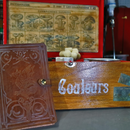Introduction: Radio Controlled Electric Teddy Scooter
The idea here was to make something for a bit of fun and to incorporate a Teddy Bear. Initially the aim was to put this onto a tricycle although the price of these on ebay seem a bit extreme. So in the interim I was going to get a second hand electric scooter and use the motor and wheel. However that soon went out of the window.
Step 1: Obtain the Scooter
It didn't take long to find an old scooter on eBay, this one was billed as "working" but with no charger. At the princely sum of 99p and no other bidders it was purchased. It actually had some charge in it and was working. A LONG slow charge of the batteries actually got them back to life although far too weak to carry an adult.
Step 2: Inside the Scooter
- The deck is held on with a couple of screws and reveals the 2 Sealed 12v batteries. With these out a nice large bay is left. The speed controller is pretty typical of these and has 3 connections. These are normally a charger , the speed control which is a hall effect throttler and a brake connection. At the other end there are connections for the motor and the battery (via a cut-out fuse and an On/Off switch). On a fly lead there is also a LED for a power indicator.
Step 3: Battery Tray
To replace the SLA batteries I opted to use a 22v LIPO pack and constructed a battery tray with the 3D printer.
Step 4: Interfacing With the Radio Control
To be able to simulate the hall effect throttle, I am using an arduino that listens to the PWM stream from the RC rx and this turns it into a 0-4.5v voltage level. However it draws a bit too much current for the arduino so a simple op-amp is in place that can drive the ESC input.
Step 5: Stablisers
A bit of cheating here in that to keep the scooter upright I printed up some 3D stabilisers to hold some skateboard wheels and added these to the main battery box.
Step 6: RX BEC
With the main battery running at 22V a simple PSU step down adapter is used to derive 5v for the RX, the servo and the arduino. This was also placed into a custom 3D printed holder.
Step 7: Electronic Sled
Here you can see the electronic bay with everything in place. I didnt use a PCB , just a small breadboard for this as its not expected to be taking a lot of jolts.
Step 8: Servo for Steering
Initially a fabricated servo mount and end support mount was going to be used, but after a couple of tests there really wasn't much load on the steering , so the top mount was discarded. Original plan was to use an old Tonegawa servo, but the strength of this was just overkill and a cheaper hobby servo was used instead.
Step 9: Deck Cutout
A simple hole was cut into the deck and the servo operates the front wheel. A simple servo horn was printed up and bolted to the front wheel axle holder. Also used my truster hole cleaner to remove the sharp edges from the holes.
Step 10: Operation Ted
With a suitable Ted obtained, a simple skeleton was inserted inside using some 6mm steel rod. The rods had some tabs brazed onto them so they could be screwed onto the standard deck mounts. The top of the rods had a plastic water bottle so that they wouldnt poke out of the top of Teds head.
Step 11: Posing Ted
Ted was then posed into a riding position and just rubber band were used to keep his paws on the bars.
Step 12: Driving Ted
With everything in place, Ted seems to drive fairly OK with the stabilisers. It certainly prefers flat ground and perhaps could benefit with some wider stabilisers. However if the turns are kept shallow and the speed fairly low then its fine. Run time seems like forever at the moment and have not really tested the endurance. Will be keeping this for the summer to take it down to Southend to drive along the prom and down the pier.




